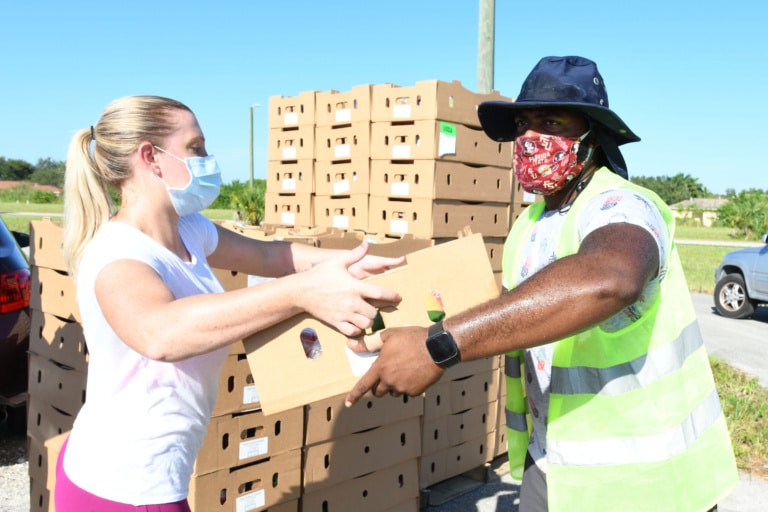The Arizona Food Bank Network is buying locally grown food to put cash back into the hands of farmers who have lost business due to COVID-19. Friends of the Farm, an Arizona Food Bank Network pilot program, is using federal funds distributed by Arizona to buy food from small farms for food banks.
COVID-19 poses unique challenges to small farm businesses who normally sell to schools, restaurants, or stores which are now either closed or buying less food.
But eight farmers are now providing broccoli, cauliflower, potatoes, and a variety of other fresh fruits and vegetables to food pantries statewide in a time when the number of families seeking food assistance have increased substantially.
Friends of the farm was a lifesaver, said Chaz Shelton, the founder and CEO of Merchant’s Garden, a small food producer located in downtown Tucson that grows varieties of lettuce.
He and his dad Billy Shriver, the chief operating officer of Merchant’s Garden, watched as 40% of sales disappeared overnight last spring at the beginning of the pandemic. Restaurant and school closures made up the majority of lost sales.
“It felt like we got punched in the gut,” said Shriver.
In an attempt to sell the food meant for schools and restaurants, Merchant’s Garden set up a small storefront in downtown Tucson, something it had never done before. Local grocery markets in Tucson also started buying small amounts of its food.
“The support from these neighborhoods has been amazing,” Shriver said. But there was still a lot of product leftover.
Then Shelton received a call from the governor’s office, in which he learned about the Friends of the Farm program.
Angie Rodgers, president and CEO of the Arizona Food Bank Network, said the idea for Friends of the Farm came to the organization a year ago, before the pandemic. It was modeled after similar programs in other states.
Similar programs typically use state funding to buy from large farm businesses spending around $20 million to $30 million a year, Rodgers said. What makes this program unique is the emphasis on small farms.
“In order to be classified as a small grower, you have to make $350,000 in gross revenue or less,” said Rodgers. Friends of the Farm wants to focus on small growers so they can expand their operation, sell food to food banks, and survive COVID-19’s economic impact.
According to Feeding America, the largest food bank network in the U.S., 1 in 8 people living in Arizona are food insecure. Rodgers said that small farmers often face insecurity too, and some don’t make enough money to feed their families. The program invests in the business as well as their families.
“We’re also paying the true cost of the food,” said Kate Radosevic, Friends of the Farm program coordinator. “We aren’t asking for the farmers to sell it dirt cheap. We understand that they need to pay themselves, pay their staff, buy equipment, and pay bills.”
Rodgers said members of the food bank network went to Gov. Doug Ducey with the idea and that he was quick to advocate for the project. Friends of the Farm received $250,000 from The Arizona Department of Economic Security in February.
“Then we got COVID-19,” Rodgers said.
The governor contacted the Arizona Food Bank Network and asked it to invest in growers who were struggling. He added an additional $250,000 for the program, giving the pilot an additional year.
As of now, the program is contracting directly with small farm growers from around the state, said Radosevic.
“There’s actually over 12,000 small farms in the state of Arizona. There are a lot of eligible candidates for the program,” she said.
Radosevic also said that this program is an opportunity to send nutritious food to areas of the state that do not have access to farm fresh produce.
Shelton said COVID-19 has made him rethink the business model. Before the pandemic, his focus was on selling to restaurants, but he said he isn’t optimistic restaurants will return to the way they were before the pandemic.
Shriver and Shelton said that they have wanted to move into packaging since the beginning of their business as a way to move their food across the state. Their partnership with food banks has given them this opportunity earlier than they expected. It also opens up new business opportunities.
“We are super thankful to be able to use the Arizona food banks to get food to folks that have a really high need,” said Shelton.
Funding for Friends of the Farm ends July 30, 2021 but Rodgers said that she feels good about continued government support and expansion of the program.
For more information about Friends of the Farm, visit its website here.




